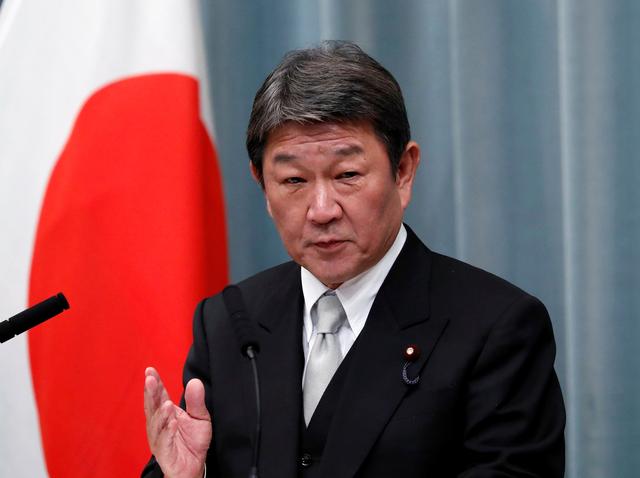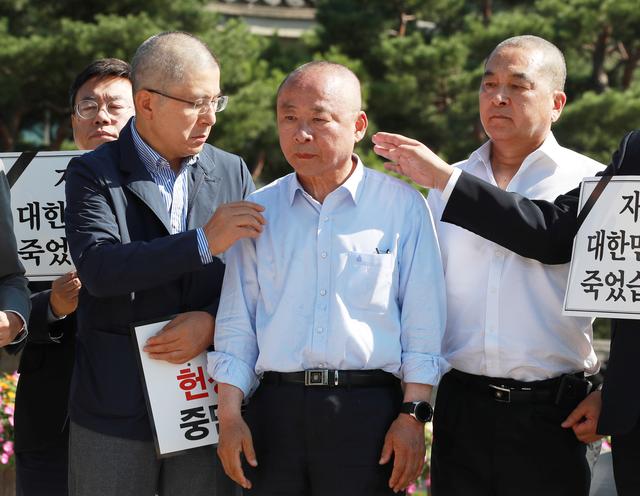On June 13, 2018 the US government-funded National Endowment for Democracy presented its 2018 Democracy Award to a collection of
Korean activists who aim to topple the communist government of North Korea.
The event was timed to coincide with President Donald Trump’s peace summit in Singapore with Kim Jong-Un. The ceremony appeared to be the opening shot of a massive public relations effort aimed at stifling normalized relations with North Korea.
I covered the ceremony because these organizations are doing precisely what Congress accuses Russia-funded media outlets and troll farms of doing in the United States. They interfere in other countries’ politics with foreign money. The only difference is they do it openly, and in the name of spreading freedom.
Founded in 1983 by then president Ronald Reagan, the National Endowment for Democracy became an international vehicle for the neoconservative agenda. Its founding cadre were Cold War ideologues who were, like so many early neoconservative operatives, former Trotskyists who once belonged to the Social Democrats, USA organization.
Over the years, the NED and its partner organizations have weaponized civil society and media against governments that stand in the way of right-wing, free market parties and corporate interests.
Heavy payouts for anti-DPRK testimony, with embarrassing results
Among the groups honored at the NED gathering was the Unification Media Group. They foment internal opposition to the North Korean government through shortwave radio broadcasts.
Also on hand was a collection of defectors. These activists are responsible for much of what the West believes about North Korea and its human rights record. While many tell harrowing tales of escape from political repression, others have been exposed as serial fabricators lured by hefty sums of cash.
In 2017, South Korea
quadrupled the payout for testimony from North Korean defectors t
o a whopping $860,000. The bounty has incentivized colorful accounts of sadistic — and unusually creative — human rights abuses.
According to
one defector, a crowd of 10,000 was forced to watch the execution of 11 musicians for the crime of viewing porn. He said the musicians were shot with anti-aircraft guns, then run over with tanks. Another defector claimed female prisoners were raped and then forced to hand their babies over to be used as food for hungry guard dogs.
That same year, news of the
defection of 13 North Korean waitresses provided a boost to Pyonyang’s opponents
But recently, the waitresses’ manager
admitted to tricking the women into leaving
under pressure from the South Korean intelligence services. The scandal is now under UN investigation.
A separate UN investigation accusing Kim Jong-Un of crimes against humanity was marred by fabricated testimony from defectors like Shin Dong-hyuk,
who confessed to inventing parts of his story.
Testimony to US Congress by another defector, Kwon Hyuk, who claimed to have witnessed live human experimentation in North Korean prisons, helped drive the passage of the North Korea Human Rights Act in 2004. But Kwon too was unmasked as a fabulist and quickly disappeared from the public eye.
Right-wing network behind North Korea’s celebrity defector
Yeonmi Park is maybe the most famous North Korean defector. She emerged on the international scene at the One World Summit in 2014 with a heartrending tale of escape through China.
But key parts of Park’s story at the summit differed from previous testimony she had delivered.
One of the many inconsistencies in Park’s story was
documented by journalist Mary Ann Jolley, who reported that Park initially
claimed she had escaped through China with her mother
and father.
At the One World Summit, however, Park’s interviewer
claimed that she trekked through China with only her mother, who was raped by a Chinese broker — adding an entirely new dramatic piece to her narrative.
All along, Park was profiting from her fame,
earning $12,000 and up for speeches, and receiving
critical backing from a libertarian political network that included the for-profit Freedom Factory and the Atlas Foundation.
She was also made a media fellow by the Oslo Freedom Forum, an operation run by Venezuelan-American oligarch
Thor Halvorssen that weaponizes human rights in the service of neoconservative foreign policy objectives.
In 2014, in partnership with the libertarian tech billionaire
Peter Thiel, Halvorssen launched the deliberately provocative “Hack Them Back” campaign to disrupt inter-Korean peace talks.
The campaign nearly brought the Koreas to the brink of war, as the North threatened to retaliate against the
launch of balloons into its territory containing messages denouncing its leader. South Korea’s government also condemned the balloon launch, while peace activists and local residents on the border attempted to block it.
Park played a starring role in the imbroglio, drumming up support for Halvorssen’s crusade among Silicon Valley powerbrokers.
The destabilizing operation prompted Mike Bassett, a former reconaissance soldier at the Korean Demilitarized Zone and ex-information warfare officer,
to describe Park as an instrument of well funded elements hostile to peace on the Korean peninsula. He wrote that her “change in narrative warrants serious scrutiny because that narrative changed as a result of a
political and economic agenda rather than a genuine desire to inform the public about the best way to liberate North Koreans from oppression.”
Despite being criticized for changing her narrative again and again, Park returned to the national stage this June thanks to the New York Times, which featured her in an inflammatory
viral video aimed at undermining the Trump-Kim summit during which she compared North Korean leader Kim Jong-un to Adolph Hitler.
The neoconservative New York Times columnist Bari Weiss also pointed to Park’s largely discredited narrative to attack the peace summit,
writing that Park herself had been raped on her way through China. Yet Park
never even made this claim. Fortunately for Weiss, her editors at the New York Times opinion section had not bothered to conduct even a cursory bit of research on the defectors she cited.
The Transitional Justice Working Group, an NED grantee, is responsible for delivering some of these testimonies to the West.
At the NED ceremony, we met the group’s director, Hubert Younghman Lee, who emphasized the importance of American backing: “I’d like to express our sincere gratitude to bipartisan support, and also US congresspeople and US citizens especially. We are doing this work with US citizens’ tax [dollars].”
As with many high profile defectors, information delivered to Western media by South Korean intelligence has often proven unreliable, and provoked some embarrassing media updates.
In 2016, Western media filled with
reports that North Korea had executed General Ri Yong-gil. However, General Ri
turned up alive days later.
Three years before, Western media
buzzed with reports that Kim Jong Un had executed his ex-girlfriend, Hyon Song-wol, by firing squad. Months later, Hyon appeared alive as ever,
performing her music on North Korean television.
So this begs the question: is North Korea populated by zombies who rise from the dead?
Or is a US-funded influence operation cultivating opposition to engagement with North Korea by relying on often unreliable sources with dubious agendas?
Bipartisan support
During the NED ceremony, Democratic House minority leader Nancy Pelosi recalled a trip she took to Pyongyang, the North Korean capital. “When we saw the people in Pyonyang — the blank faces, the brainwashing that went on — the poverty of spirit I saw exceeded the poverty [of] any place in the world.”
Pelosi then claimed that locals were executed on the spot for unauthorized corn consumption. “They would get shot if they just took one corn on the cob, one husk of corn,” she claimed.
Pelosi was among a bipartisan cast of lawmakers on hand to pay homage to the NED. They included Republican representatives like Ed Royce and Pete Roskamp, as well as Democrats like Rep. Julian Castro and Stephanie Murphy.
Though the NED was hailed by Congress as a politically benign entity advancing democracy and human rights, its record tells a different story.





